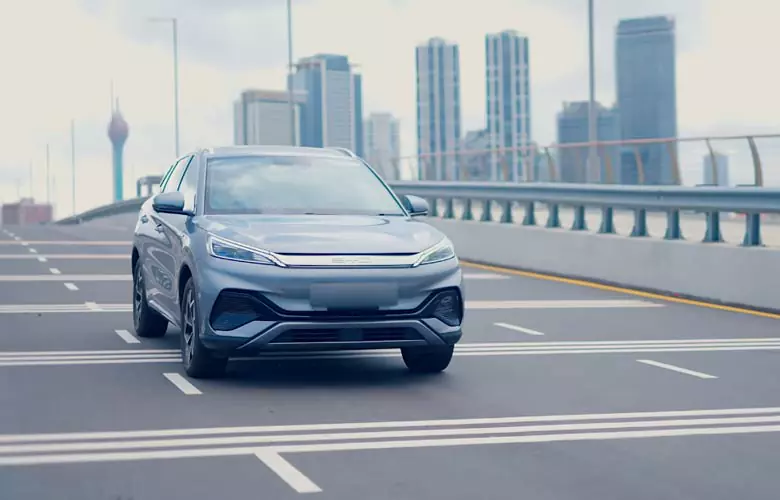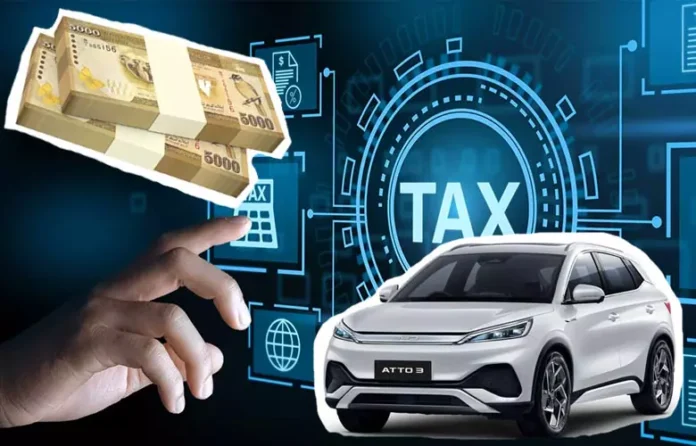By: A Special Correspondent
July 31, Colombo (LNW): In a developing controversy with potentially far-reaching fiscal implications, approximately 1,100 units of the BYD ATTO 3 electric vehicle remain detained by Sri Lanka Customs at Hambantota Port, amid allegations of tax evasion through software-based motor capacity manipulation. The matter has caught the attention of the Committee on Public Finance (CoPF) and ignited significant media and public discourse.
The issue first surfaced last week when Samagi Jana Balawegaya (SJB) Member of Parliament Mujibur Rahman raised concerns in Parliament regarding stark discrepancies in the taxation of new and reconditioned BYD ATTO 3 vehicles imported from China.
According to MP Rahman, brand new ATTO 3 vehicles are subject to a tax of approximately LKR 5.5 million, while reconditioned versions of the same model attract only around LKR 1 million in duties. This discrepancy, he asserted, stems from differences in the declared motor capacity—100kW for new units and 150kW for reconditioned ones.
The MP insisted that these vehicles are technically identical, with no difference in hardware, and alleged potential fraud by the importing company. He argued that a tax reduction of approximately LKR 4.5 million per vehicle for the same model is implausible and highly suspicious.
He went further to suggest that the importer might have manipulated the declared specifications to benefit from lower customs duties, thus defrauding the state and undermining public revenue collection.
The Software Downgrade Argument
The company in question, John Keells CG Auto Pvt Ltd, the exclusive local distributor of BYD vehicles and a subsidiary of the John Keells Group, claims that although the vehicles are manufactured with 150kW motors, they have been ‘software-limited’ to 100kW specifically for the Sri Lankan market. They cite that the same software-restricted models are sold in Singapore, and argue that since the manufacturer officially declares the power output as 100kW, taxes should be assessed accordingly.
This explanation has raised critical questions: Does Sri Lanka Customs assess tax based on the physical capability of the motor or the software-controlled output? Can a more powerful, higher-end vehicle receive a lower tax simply due to a software-imposed limitation that could potentially be reversed?
The implications extend beyond mere classification. In the production of electric vehicles (EVs), models with 150kW motors are typically larger, more luxurious, and equipped with superior features compared to 100kW versions. If such vehicles are permitted lower tax rates due to software downgrades, it would not only represent a loss of government revenue but also an unfair commercial advantage for the importer. In this case, the alleged per-vehicle benefit of LKR 4.5 million could amount to LKR 10 billion across the 1,100 detained vehicles and an estimated 1,000 already sold units.
A Dangerous Precedent
The matter has sparked broader concern over the precedent such software-based tax interpretations may set. If this method is accepted, it raises the question of whether other importers could intentionally down-specify or “lock” features via software—from engine power to safety systems—to qualify for reduced taxation, only to later unlock them post-importation.
A hypothetical example posed by critics is whether a six-wheeled vehicle could be taxed as a four-wheeled one if two wheels were “locked” or rendered inactive by design or software, with the manufacturer certifying it as such. If the company goes on saying that a luxury car with a motor power of 390kW, which is in their stock, is locked to 100kW via software and sent to Sri Lanka, will it also be exempted with a lower tax of Rs. 2.5 million?

Chinese EV Manufacturers Watching Closely
Compounding the issue is intelligence suggesting that three other Chinese electric vehicle manufacturers are monitoring how the Sri Lankan government addresses this loophole. Should the software limitation approach be accepted, these companies are reportedly ready to similarly downgrade 150kW vehicles to 100kW via software and export them to Sri Lanka.
This could potentially cost the Sri Lankan government hundreds of billions of rupees in lost tax revenue over time, a burden that would ultimately fall on the general public.
The broader concern is whether this might open the floodgates to widespread tax evasion under the guise of software-based modification, with little to no enforceability once the vehicles are in private hands. Given Sri Lanka’s ongoing fiscal recovery amid an economic crisis, any form of systemic revenue loss would be catastrophic.
Concerns Over Enforcement and Tampering
There is also significant scepticism about Sri Lanka’s ability to enforce such software restrictions, should these vehicles be allowed in under the 100kW classification. In a context where technical tampering is common and accessible, critics worry that local firms could simply restore the vehicles to their original 150kW capacity—thereby enjoying the benefits of lower tax while still selling or using higher-performance vehicles.
John Keells: A Controversial History
The issue is further complicated by the involvement of John Keells Holdings, which has faced previous allegations of tax avoidance and regulatory evasion.
One notable instance dates back to 2002, when John Keells acquired Lanka Marine Services Ltd (LMSL) from the Ceylon Petroleum Corporation (CEYPETCO) through the Public Enterprise Reform Commission (PERC). The sale was legally challenged by former MP Vasudeva Nanayakkara, and in 2008, the Supreme Court ruled the privatisation illegal, ordering the return of the business to the state and citing unfair tax concessions granted to John Keells.
More recently, the company has come under fire for its “City of Dreams – Sri Lanka” integrated resort project, set to open on August 02. Allegations have emerged that a casino, operated by Melco Resorts & Entertainment Ltd, a Hong Kong-listed firm led by Lawrence Ho Yau Lung, is being included in the development and may have benefited from tax concessions under the Strategic Development Act—despite a 2015 Cabinet decision prohibiting such activity. Under Sri Lankan law, casino operations are ineligible for tax incentives, further fuelling suspicions of preferential treatment.
An Urgent Need for Accountability
This incident has exposed gaping vulnerabilities in Sri Lanka’s customs and taxation systems, particularly concerning the treatment of software-modifiable goods such as electric vehicles. If permitted, it could pave the way for a new form of sophisticated tax evasion, facilitated not by smuggling or falsified documents, but by technical ambiguity and regulatory oversight.
Big businesses are vital to economic growth—but only when they adhere to the rule of law. If allowed to manipulate systems for personal or corporate gain—especially during a time of national economic fragility—they cease to be national assets and instead become economic liabilities.
The Sri Lankan government must act decisively to resolve this issue and close any regulatory gaps that allow for the circumvention of fair tax practices—lest it risk further undermining public trust and jeopardising long-term economic recovery.

